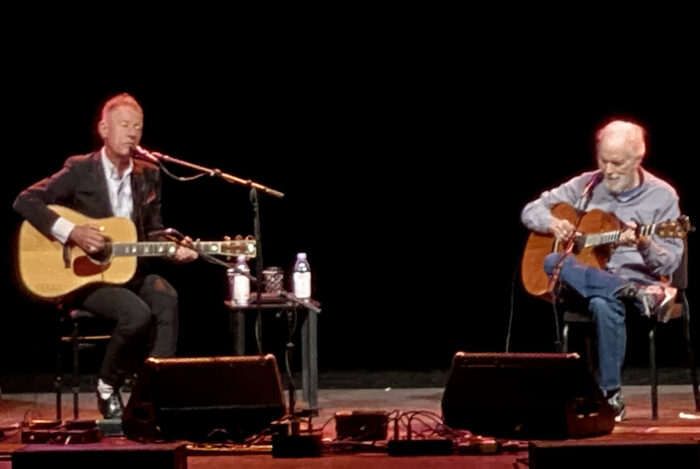Lyle Lovett was laconic in formal wear, the negative image of the loquacious Leo Kottke, causally seated beside him in jeans for an evening in Conversation and Song, as their joint tour is called.
Opposites, yes. But opposites that attracted a large, Saturday-night crowd to Newark, Ohio’s, Midland Theatre Oct. 28 and rewarded them with a performance that was as laugh-out-loud hysterical as it was musically awe-inspiring across 130 minutes of banter and song trading. It’s a format, Kottke said, that teaches musicians more than any other concert setup and reminds them that improvisation is little more than panic setting in.
Both guitarists were battling a respiratory virus and had to suppress coughs off-mic. But whatever was ailing Lovett and Kottke did nothing to dampen the humor and the music that unfolded.
Talking about supermarkets in his smooth Texas drawl, Lovett said his wife won’t say the words: Piggly Wiggy. She calls it, “that store.”
“I don’t like Come and Go,” Kottke shot back in a gravely baritone.
Unlike the banter, the songs were mostly solo, though Kottke did join “She’s No Lady” mid-performance and the pair encored by duetting on Lovett’s “Church” as Kottke’s low voice and fast-fingered fretting paired beautifully with Lovett’s higher, raspier, croon and simpler guitar style.
And there’s not shame in simpler playing as most guitarists display less flash than Kottke. He’s a band of one who transformed his six-string – no 12-string on this evening – into an aural six-piece as he played “Twice,” from his partnership with Phish’s Mike Gordon; sung of love almost consummated on “Julie’s House;” and nodded to other artists, including Derek Trucks and Michael Hedges on John Fahey’s “The Last Stream Engine Train.” All told, Kottke offered seven majority instrumental songs that saw him employing slide, fingerpicking, harmonics, feedback and other devices to create the sounds unique to his performance style.
“Leo, every note you play is perfect,” Lovett said before posing a question:
“What came immediately after the steam engine?”
“A Plymouth,” Kottke replied.
For his part, Lovett played seven solo numbers in addition to the aforementioned. He mixed such far-flung covers as Tammy Wynette’s “Stand by Your Man” and Guy Clark’s “Texas – 1947” with self-written fan favorites including “12th of June” and “Pony on My Boat.” And when Lovett performed “Ain’t it Something” after a particularly long-winded, circuitous and hilarious monologue from Kottke, during which he declared nothing is more frightening than happiness and freedom, Lovett explained the selection by saying: “That was the only song I could think of to support your story.”
Kottke wasn’t surprised.
“Non-sequiturs don’t faze me,” he declared.
Nor the audience, which laughed as lustily at the pair’s unscripted patter as it applauded their also in-the-moment music.



No Comments comments associated with this post